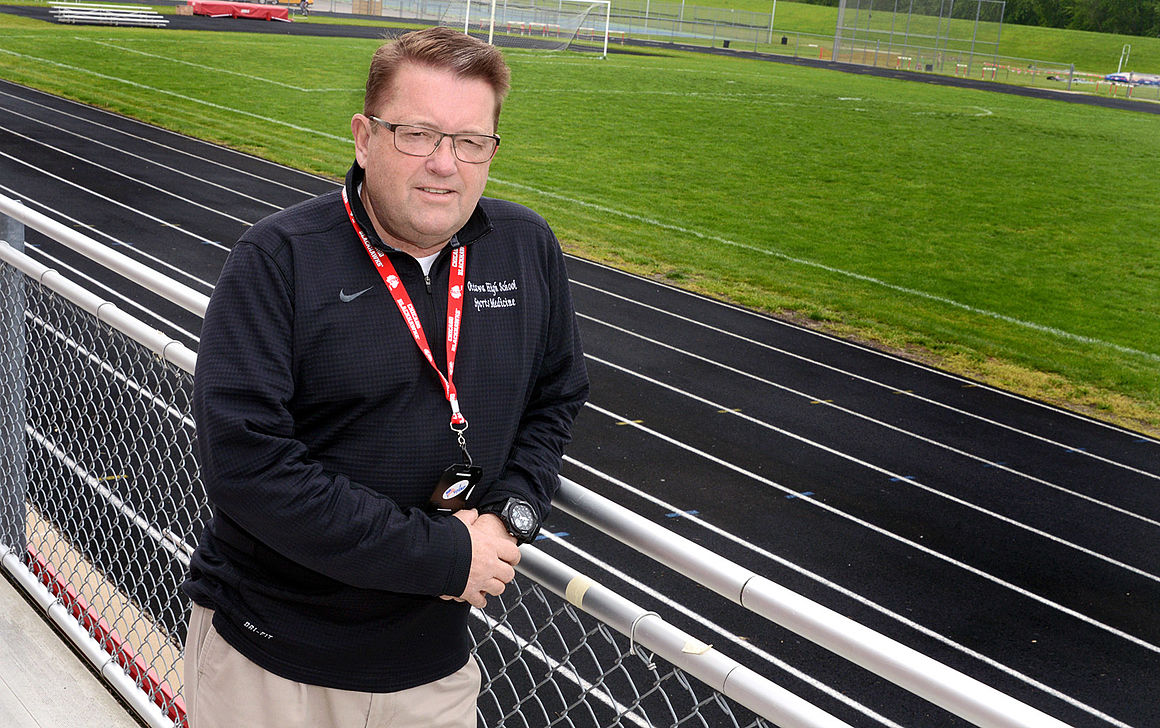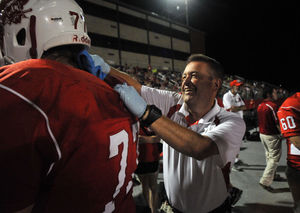
Article reposted from The Times
Author: Jerrilyn Zavada
After spending 35 years as Ottawa High School’s athletic trainer, and 27 teaching a sports medicine curriculum he developed, Joe Haywood is hanging up his educator hat.
Well, sort of.
When Haywood retires at the end of this academic year, he will begin acting as a substitute trainer for other schools in Ottawa’s conference. He has considered continuing substituting as a teacher.
“It’s still not out of the question, but athletic training is a lot less stressful,” Haywood said.
Haywood is one of three educators who last week was presented the Excellence in Education award by the Regional Office of Education.
He graduated from Ottawa High in 1976 after participating in football, swimming and baseball. When it came time to consider what to do after graduation, Haywood said his mother encouraged him to pursue physical therapy.
“I talked to counselors here, but they didn’t have a lot of information,” he said. “So they sent me to Marv Graunke, who was the head athletic director. He had some information on sports medicine and he thought that would be a better niche for me to try, and I liked it.”
A few years into his tenure at the school, Haywood began helping coaches in the weight room, where he hurt his wrist, requiring surgery.
“It made my job as trainer a little difficult,” he said. “Ron Spandet, a coach at the time, suggested teaching students some stuff, so I started a student training program. I mostly taught tape and first aid.”
Before long, Haywood pursued his master’s degree, during which time he wrote a curriculum for a sports medicine program. Administrators liked what they saw and soon the program was initiated at the school. Haywood now has four sections of the class all year long.
“I think it gives them an alternative to regular physical education classes,” Haywood said. “Also I think it has motivated teachers to think outside the boxes for alternative PE classes. It’s not the PE I had in school. There are a lot of variances. It gives kids a basic knowledge of the medical field. We do terminology and anatomy. … There’s more to this than just memorization.”
Haywood credits his students with keeping him on his toes, motivating him, he says, to keep doing what he’s doing.
“Every summer I change my curriculum because of something I’ve learned or something the kids have shown me,” he said. “It keeps the program from being stagnant and keeps me from being stagnant.”
Like most educators, Haywood takes his role as a teacher and role model seriously. He says his goal is to help his students do better in school than he did.
“I don’t get mad at them,” he said. “I get mad at their choices. When I know they can get a better grade, sometimes I have to push them and get in their face. My wife says I’m brutally honest at times and I think that’s the way I have to be. These kids need someone that’s honest with them.”
Through the years of his teaching health and the popular sports medicine program, Haywood has received a great deal of feedback from former students.
“I had a kid a few years ago in football and wrestling,” he remembered. “He took this class because he was exposed to us. After the class he said ‘I found what I want to do.’ And I said, ‘What’s that?’ He said athletic training. For me it was out of the blue … I like to get the feedback from the students. It makes me feel good. I like to go watch kids who have graduated play football. Kids going to school for the medical field, you can’t watch them on Saturday and Sunday. They are pursuing something we had in common.”
As the school year winds down and the prospect of retirement beckons, Haywood looks back over his notable career and feels content knowing he has had an impact on others’ lives.
“(I have) a lot of memories,” he said. “The knowledge that I did help somebody. You want to come out and say, ‘Did I do all I could do?’ ‘Did I help somebody?’ ‘Did I change someone’s life?’ That’s what we all want to do. … It’s been a lot of fun. It’s been a lot of fun. Kids, coaches, fellow teachers, staff. Good people. I’ve met a lot of good people and feel blessed because of that.”
